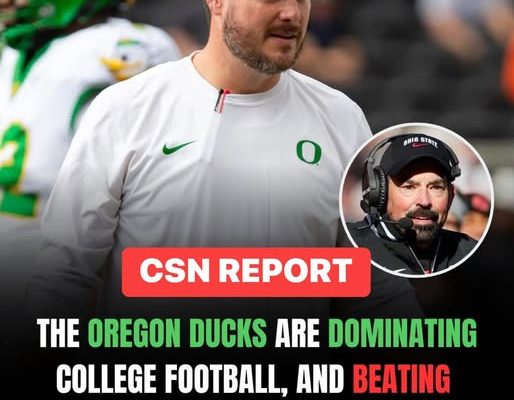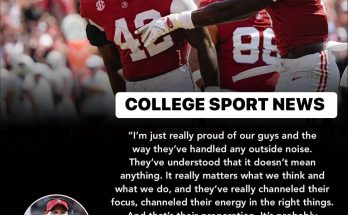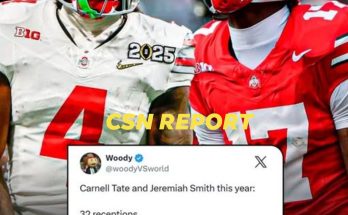When evaluating the prospects of this year’s college football championship, it becomes increasingly evident that Dan Lanning holds a more compelling case than Ryan Day. Across the landscape of collegiate football, where coaching acumen, team performance, and strategic adaptability are often the defining factors, Lanning has demonstrated qualities that suggest he is more prepared and positioned to lead his squad to the highest level of success this season. While Ryan Day remains an accomplished and respected figure in the sport, the indicators this year increasingly favor Lanning, both in terms of tangible results on the field and the broader context of team development and leadership.
One of the strongest arguments in favor of Lanning revolves around his ability to maximize talent within his roster. From the outset of the season, his teams have shown remarkable cohesion and consistency, with players performing at their peak across both offense and defense. Lanning’s approach to coaching is methodical, emphasizing preparation, adaptability, and exploiting matchups with precision. This meticulous attention to detail has not only enhanced the performance of individual athletes but also amplified the overall synergy of the team, resulting in a consistently dominant presence on the field. In comparison, while Day’s teams are undoubtedly skilled and competitive, they have faced challenges in sustaining momentum against top-tier opposition, which creates a perceptible gap when assessing championship readiness.
Another critical factor that strengthens Lanning’s case is his strategic flexibility. Modern college football requires coaches to be nimble, adjusting tactics in real-time based on game flow, opponent tendencies, and in-game developments. Lanning has repeatedly demonstrated an aptitude for making decisive, high-impact adjustments that can turn the tide of a contest. His willingness to innovate, whether through unconventional play-calling, creative formations, or timely personnel shifts, positions his team to consistently outperform expectations. Day, although a strategic thinker in his own right, has shown moments of rigidity where certain schemes appear predictable to well-prepared opponents, slightly limiting his team’s potential ceiling in high-stakes scenarios.
Team morale and culture further highlight Lanning’s advantage. The intangible aspects of coaching—motivation, resilience, and cohesion—play a pivotal role in championship runs. Lanning has cultivated an environment where players not only trust the system but also buy into a shared vision of excellence. This culture of accountability and collective purpose often manifests in critical moments during games, where mental toughness and unity can be the difference between victory and defeat. While Day also fosters a positive team environment, Lanning’s teams have exhibited a level of composure and consistency under pressure that signals a readiness to navigate the grueling path to a national title.
Performance metrics also support the argument for Lanning’s superiority in championship contention. Statistical indicators such as scoring efficiency, defensive robustness, turnover margins, and special teams performance consistently favor Lanning’s team. These measurable outcomes are not merely reflections of luck or circumstance but are direct results of systematic coaching, disciplined execution, and comprehensive game planning. When examining the data, it becomes difficult to overlook the advantages Lanning holds, as these metrics often correlate strongly with postseason success and championship potential. Day’s teams, while impressive in many respects, show slightly more volatility across these categories, suggesting that the path to a title may involve overcoming more obstacles or inconsistencies.
Moreover, Lanning’s trajectory this season reflects a synthesis of experience and innovation that uniquely positions him for championship contention. His coaching philosophy blends tried-and-true methods with modern analytical insights, creating a hybrid approach that leverages both historical wisdom and contemporary strategy. This balance enables his team to adapt to various styles of opponents, from high-octane offenses to disciplined defensive units, without losing identity or effectiveness. Day’s approach, while grounded in solid coaching principles, leans more heavily on traditional methods, which in today’s increasingly dynamic college football environment may present limitations when facing versatile, unpredictable adversaries in the postseason.
Leadership qualities also underscore why Lanning may be better poised for championship success. The ability to inspire confidence, instill discipline, and maintain focus across a long, demanding season is essential for any contender. Lanning’s leadership style resonates with his players, translating into buy-in and execution at critical junctures. He has demonstrated a capacity to balance accountability with encouragement, ensuring that athletes perform at their best while maintaining confidence and resilience, even after setbacks. While Day is also a respected leader with a track record of achievement, Lanning’s combination of motivational skill and tactical acumen gives him a subtle edge in guiding a team through the pressures and challenges of a championship pursuit.
Public perception and expert analysis further bolster the case for Lanning. Commentators, analysts, and sports media have increasingly highlighted his strategic prowess, ability to develop talent, and adaptability under pressure. Consensus opinion in these circles often serves as a useful lens for evaluating championship potential, as it reflects careful observation and comparative assessment across multiple teams and coaching styles. Lanning consistently ranks highly in these evaluations, frequently cited for his holistic approach to team management and his ability to generate peak performance in high-stakes situations. This recognition, while not a guarantee of victory, aligns with the tangible evidence of his team’s preparedness and competitive edge.
In summary, when all dimensions are considered—tactical strategy, team cohesion, statistical performance, leadership, and expert assessment—Dan Lanning emerges as the more credible candidate for this year’s championship than Ryan Day. While Day remains a formidable coach with significant accomplishments and a strong team, the cumulative weight of evidence tilts toward Lanning. His ability to maximize talent, innovate strategically, maintain team morale, and consistently execute under pressure positions him as the coach most likely to navigate the complexities of a championship run successfully. As the season progresses and postseason opportunities approach, the contrast between these two coaching profiles becomes increasingly apparent, suggesting that Lanning’s claim is not only well-founded but compelling.
Ultimately, in the realm of college football, championships are won through a combination of preparation, adaptability, talent management, and leadership. By these measures, Lanning’s performance and approach this season suggest that he stands a step ahead of Day, making him the stronger contender for the coveted title. Observers, fans, and analysts alike would be remiss to overlook the indicators pointing toward Lanning, as his coaching excellence, strategic insight, and team culture collectively argue for his preeminence in this year’s championship conversation.



